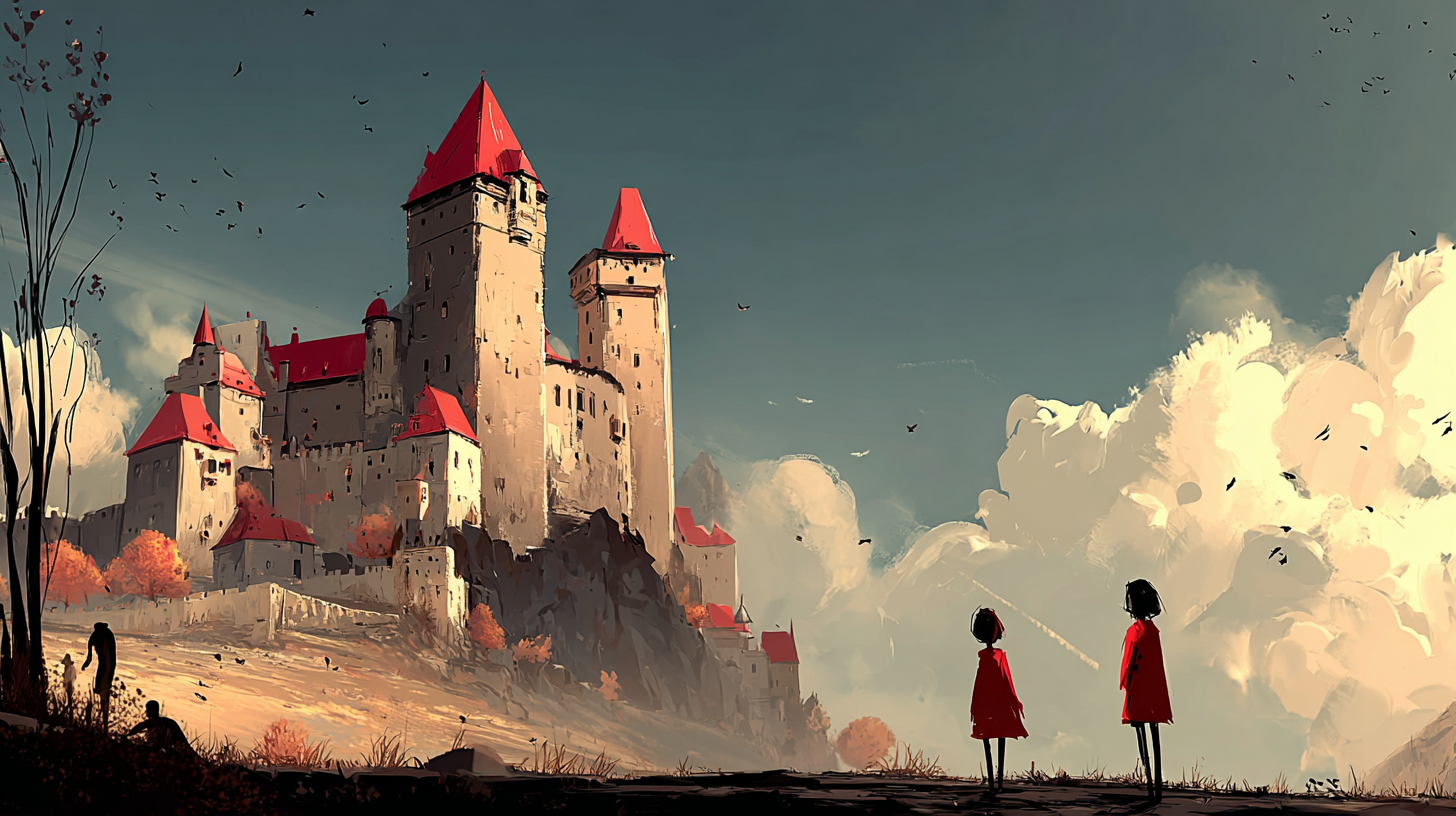A castle is a big stone house where kings or lords lived long ago.
「castle」とは、昔の王様や貴族が住んでいた大きな石のお城のこと。
以下は英単語 “castle” に関するストーリー型学習コンテンツです。まずは大枠の意味を理解して最後の文章で確認しましょう。
主な意味(main meaning)
| 品詞 | 意味 | 発音記号 | 例文 |
|---|---|---|---|
| noun (名詞) | 城、特に大きな石造りの要塞や住居 | /ˈkæsl/ または /ˈkɑːsl/ | The old castle on the hill attracts many tourists. |
語源(etymology)
「castle」はラテン語 castellum(砦、小さな要塞)に由来し、守るための「要塞・居住地」というイメージが核。
類義語(synonyms)
| 類義語 | 意味 | 例文 |
|---|---|---|
| fortress | 要塞、防御のための建物 | The soldiers protected the city from the fortress. |
| palace | 宮殿、王族が住む豪華な建物 | The king welcomed guests in his grand palace. |
| stronghold | 拠点、守りの固い場所 | The rebels hid in a mountain stronghold. |
| mansion | 大邸宅 | The rich man lives in a huge mansion. |
反義語(antonyms)
| 反義語 | 意味 | 例文 |
|---|---|---|
| hut | 小屋 | The farmer lived in a small hut near the forest. |
| cottage | 田舎の小さな家 | She spent the summer in a cozy cottage by the lake. |
コロケーション(collocations)
| コロケーション | 例文 |
|---|---|
| medieval castle | We visited a medieval castle in France. |
| castle walls | The castle walls were thick and strong. |
| castle tower | From the castle tower, you can see the whole town. |
| royal castle | The royal castle is open to the public. |
2項表現(binomials)
| 2項表現 | 例文 |
|---|---|
| castles and palaces | The tour guide showed us castles and palaces. |
| huts and cottages | In the village, there are only huts and cottages. |
英語ストーリー(english story)
The Castle on the Hill
Last summer, Emma started her new job at a travel company in England. On her first day, her manager asked her to join a tour to a famous castle. The company wanted Emma to learn how to guide tourists and explain the history of old buildings.
The castle was located on a hill, and it looked strong, just like a fortress. Its tall castle walls and high castle tower gave a feeling of power. “Long ago, kings and queens lived here,” said the senior guide. “It was not only a home but also a stronghold during wars.”
Emma listened carefully. She learned that while a palace was built mainly for beauty and comfort, a castle was designed to protect its people. The guide explained that inside the castle, there were large rooms, dining halls, and sometimes even secret tunnels.
After the tour, Emma met some tourists. One man said, “I usually visit small cottages in the countryside, but this time, I wanted to see something bigger.” Another woman added, “My family lives in a simple hut near the forest. Standing here, I feel the difference between huts and cottages, and castles and palaces.”
Emma smiled. She realized that castles were not just buildings. They were symbols of history. They showed how people once lived, fought, and dreamed.
When Emma returned to the office, her manager asked her opinion. She replied, “The royal castle is more than a tourist spot. It teaches us about the past and helps us imagine the lives of kings and common people.”
From that day on, Emma was excited about her work. She wanted to show tourists not only the beauty of castles but also the stories behind them.
和訳
丘の上の城
去年の夏、エマはイギリスの旅行会社で新しい仕事を始めた。初日に、上司は有名な**castle(城)**のツアーに参加するように頼んだ。会社はエマに、観光客を案内し、古い建物の歴史を説明できるようになってほしかったのだ。
その城は丘の上にあり、まるで**fortress(要塞)のように強く見えた。高いcastle walls(城壁)や高いcastle tower(城の塔)は力強さを感じさせた。「昔はここに王や女王が住んでいたのです」とベテランガイドが言った。「それは家であると同時に、戦争の時にはstronghold(拠点)**でもあったのです。」
エマは注意深く聞いた。**palace(宮殿)**は主に美しさと快適さのために建てられたが、城は人々を守るために設計されたのだと学んだ。城の中には大きな部屋や食堂、時には秘密のトンネルさえあるという。
ツアーの後、エマは観光客と話した。ある男性は言った。「普段は田舎の小さな**cottage(小さい家)を訪れるのですが、今回はもっと大きなものを見たかったのです。」別の女性が加えた。「私の家族は森の近くの小さなhut(小屋)**に住んでいます。ここに立つと、huts and cottages(小屋と家)と castles and palaces(城と宮殿)の違いを感じます。」
エマは微笑んだ。彼女は、城はただの建物ではないと気づいた。それは歴史の象徴であり、人々がどのように暮らし、戦い、夢を見ていたのかを示している。
オフィスに戻ると、上司が感想を聞いた。エマは答えた。「その**royal castle(王城)**は単なる観光地ではありません。私たちに過去を教え、王と普通の人々の生活を想像させてくれます。」
その日から、エマは自分の仕事にワクワクするようになった。彼女は観光客に、城の美しさだけでなく、その背後にある物語も伝えたいと思った。
Q&A
Q: 「castle」と「fortress」の違いは?
A: 「castle(城)」は住む場所と守る機能を持つ建物ですが、「fortress(要塞)」は純粋に軍事的な防御施設を意味します。城には王や貴族が住みますが、要塞には住まいの要素は少ないです。
Q: 「castle」と「palace」の違いは?
A: 「castle(城)」は防御を目的に作られた建物で、「palace(宮殿)」は王や皇帝が豪華に暮らすための住まいです。城は強さ、宮殿は美しさや贅沢さを強調します。
Q: 「castle」と「stronghold」の違いは?
A: 「castle(城)」は具体的な建物を指すのに対し、「stronghold(拠点)」は物理的な建物に限らず、勢力の中心地という意味もあります。たとえば「a cultural stronghold(文化の拠点)」のように比喩的にも使われます。
Q: 「castle」と「mansion」の違いは?
A: 「castle(城)」は歴史的に王や貴族が住んでいた要塞型の建物で、「mansion(大邸宅)」は現代的にお金持ちが住む大きな家です。お城のように防御機能はなく、住居としての豪華さを表します。
Q: 「castle」と「hut」の違いは?
A: 「castle(城)」は大きくて堅固な石造りの建物ですが、「hut(小屋)」は木やわらで作られた、とても小さくて質素な建物です。規模も機能も正反対です。
Q: 「castle」と「cottage」の違いは?
A: 「castle(城)」は歴史的で壮大な建物ですが、「cottage(田舎の小さい家)」は自然の中にある素朴で居心地のよい家を指します。お城は権力の象徴、コテージは生活の温かさを感じさせます。
Q: 「castle」と「medieval castle」の違いは?
A: 「castle(城)」は一般的なお城全般を指しますが、「medieval castle(中世の城)」はヨーロッパ中世に建てられた特定の時代のお城を強調しています。
Q: 「castle walls」と「castle tower」の違いは?
A: 「castle walls(城壁)」は城を取り囲む防御用の壁を指し、「castle tower(城の塔)」は城の高い部分で、見張りや象徴的役割を持ちます。
Q: 「royal castle」と普通の「castle」の違いは?
A: 「royal castle(王城)」は王や王族が使っていた特別なお城を指し、普通の「castle」は貴族や領主の住まいであった場合も含みます。



コメント